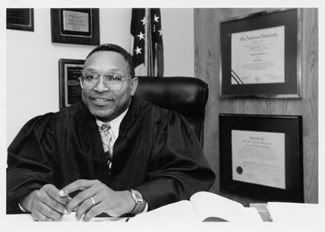Why Did A Bush Judge Over-Sentence Libby?
 I expected U.S. District Court Judge Reggie Walton, the guy who sentenced Scooter Libby to 30 months, to have a vitae fit for a particularly outraged C-SM post. But check it out:
I expected U.S. District Court Judge Reggie Walton, the guy who sentenced Scooter Libby to 30 months, to have a vitae fit for a particularly outraged C-SM post. But check it out:Judge Reggie B. Walton assumed his position as a United States District Judge for the District of Columbia on October 29, 2001, after being nominated to the position by President George W. Bush and confirmed by the United States Senate. In May 2007, Chief Justice John Roberts appointed Judge Walton to serve as a Judge of the United States Foreign Intelligence Surveillance Court, which is a 7-year appointment. Judge Walton was also appointed by President Bush in June of 2004 to serve as the Chairperson of the National Prison Rape Reduction Commission, a two-year commission created by the United States Congress that is tasked with the mission of identifying methods to curb the incidents of prison rape. Former Chief Justice Rehnquist appointed Judge Walton to the federal judiciary's Criminal Law Committee, effective October 1, 2005. Judge Walton previously served as an Associate Judge of the Superior Court of the District of Columbia from 1981 to 1989 and 1991 to 2001, having been appointed to that position by Presidents Ronald Reagan in 1981 and George H. W. Bush in 1991. While serving on the Superior Court, Judge Walton was the court's Presiding Judge of the Family Division, Presiding Judge of the Domestic Violence Unit and Deputy Presiding Judge of the Criminal Division. Between 1989 and 1991, Judge Walton served as President George H. W. Bush's Associate Director of the Office of National Drug Control Policy in the Executive Office of the President and as President Bush's Senior White House Advisor for Crime. (emphasis added)No ready cheap shots there; here's a judge who's career has been in close orbit with GOP presidents since 1981. Had he been a Clinton appointee ... or worse, a Carter man ... today's sentence could have been passed off more easily.
But it's much more complex. To get the sentence, Patrick Fitzgerald had to do one thing and hope for another.
First, after getting Libby's conviction by arguing endlessly that it didn't matter whether Plame was a covert agent or not because that wasn't what Libby was charged with, he revealed that Plame was, in fact, covert for about a year and a half.
That allowed him to argue under federal sentencing guidelines that the underlying offense -- the outing of a CIA agent, a charge Libby was not charged with -- was so heinous that a severe sentence was warranted. In the words of Time reporter Reynolds Holding,
To get a sense of the absurdity of this, think of someone found guilty beyond a reasonable doubt — the highest level of proof — of dealing 20 grams of cocaine, and the judge saying, hey, there's evidence that you dealt 10 times that amount, so you get an extra eight years.Then, Fitzgerald had to hope Walton would choose to use the federal sentencing guidelines. He didn't have to; after all, the Supremes had made them discretionary in a Jan. 2005 decision.
Holding says the inside line on the sentencing was that Walton would opt not to use the guidelines. The Left felt so because of Walton's Bush-centric career, the Right out of sheer disgust at the outrageous behavior of Fitzgerald.
Walton proved both sides wrong. Why?
Perhaps it was a conservative's expression of impatience with Bush's squandering of GOP solidarity. Perhaps it was a federal judge's way of firing a shot across the noses of future leakers.
Whatever it was, Scooter's unfortunate life just got unfortunate-r.
hat-tip: Real Clear Politics
Labels: Plame




<< Home